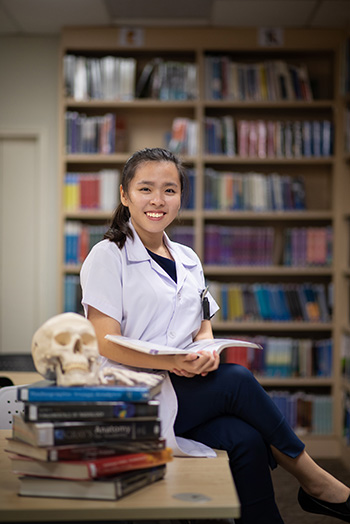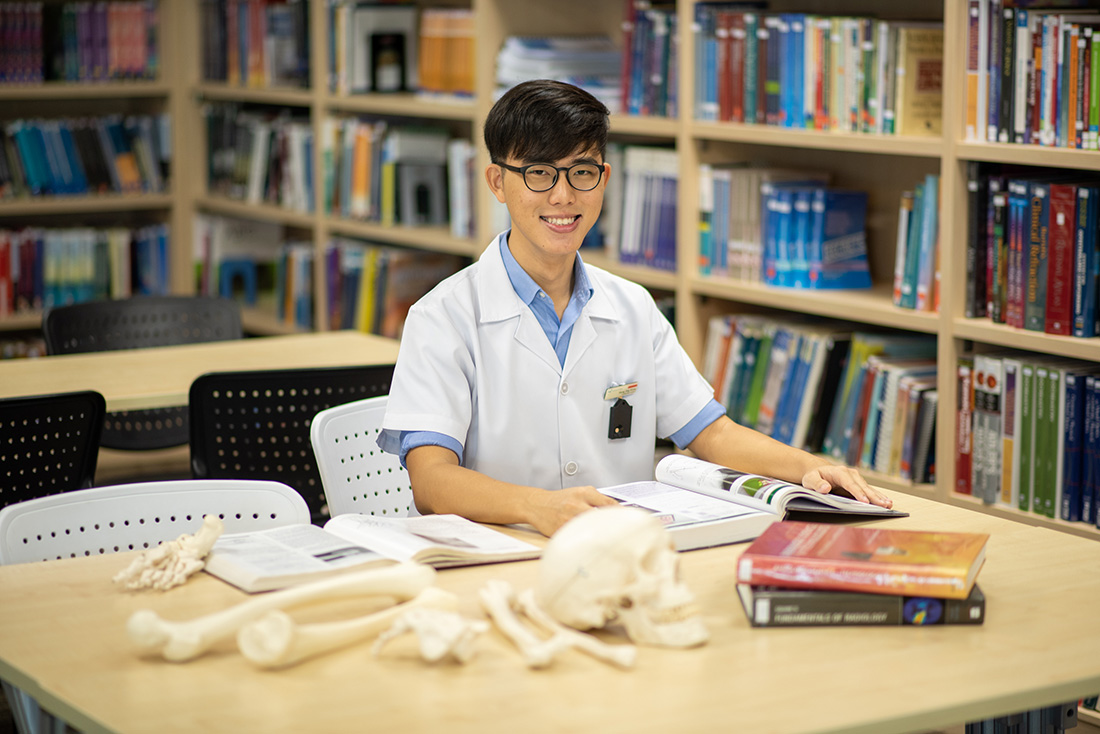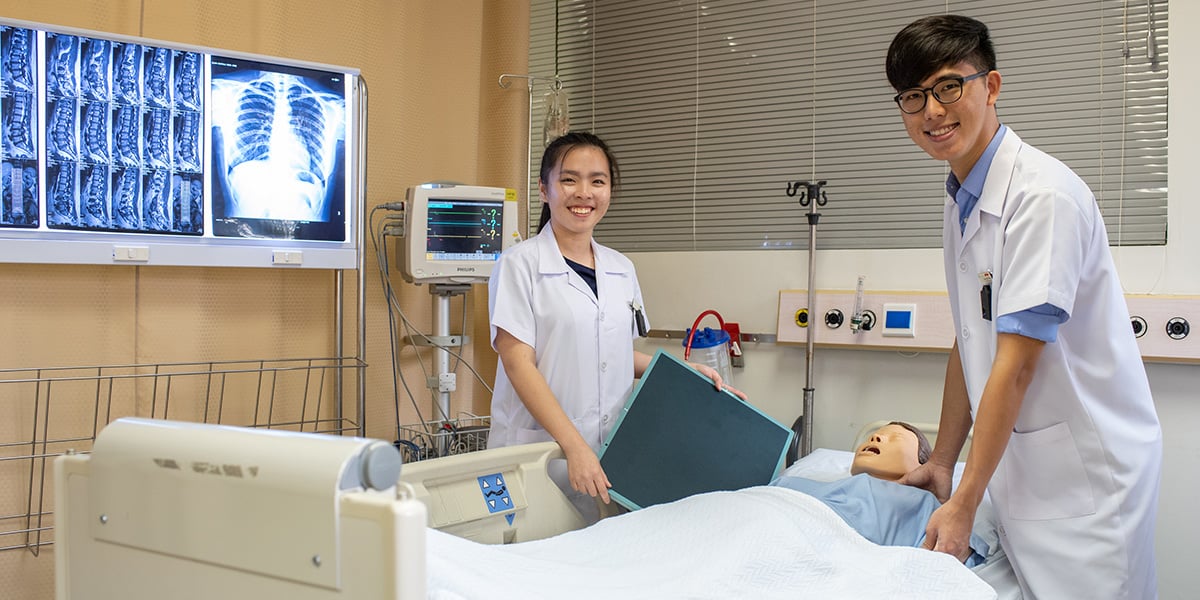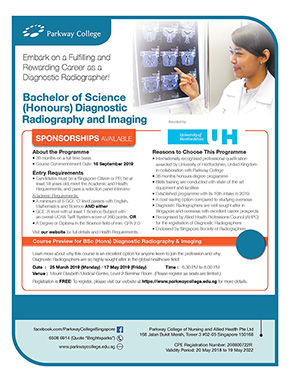At Parkway College of Nursing and Allied Health, a rigorous and hands-on structure assures that graduates will be well-trained in the competencies needed before they begin their jobs in the niche fields of nursing, allied health, and healthcare management.
The Bachelor of Science (Honours) Diagnostic Radiography and Imaging is one of the sought-after courses that Parkway College offers through partnerships with reputable universities. Awarded by the University of Hertfordshire in the United Kingdom, the degree is internationally recognised and provides excellent prospects for students. We speak to two radiography undergraduates, 21-year-old Kho Jie Qi and 23-year-old Hung Jing Xiang, to find out how Parkway College is honing their skills to excel in their field.

Kho Jie Qi
Undergraduate
Bachelor of Science (Honours) Diagnostic Radiography and Imaging – University of Hertfordshire
What is your motivation for getting into radiography?
Jing Xiang: I had my first experience with radiography when I broke my ankle when I was a child. I was scared and in great pain, but during my first X-ray examination, the radiographer’s warm and friendly demeanour helped to alleviate my anxiety. I was also fascinated by how a machine could so easily see the insides of my body! When deciding on my future career path after my A levels, I discovered that the career of a radiographer could integrate both my desire to help others and my love for high-tech machinery, making this job an excellent match for me.
Jie Qi: When I was 18, I had an injury and had to be admitted to the hospital. During that time, I had the chance to interact with many of the healthcare staff for the first time in my life and they made a strong impression on me. I was very impressed by the dedication that they had for their work and for the patients that they were taking care of. That was when I started gaining interest in the healthcare industry. Having the chance to review the X-ray I had taken was a first for me, and I found it interesting to think about how the image was produced. This got me interested in learning about the science behind radiography.
What do you like about the curriculum at Parkway College of Nursing and Allied Health?
Jing Xiang: Parkway College provides me with opportunities for clinical placement at many different radiology departments in hospitals in order to learn and observe from radiographers who are experts in their specialisations, such as CT, MRI, and ultrasound. The college also guides me to continually upgrade my skills through the upkeep of my clinical portfolio. Practical sessions held at various hospitals and at Philips APAC Center aid us in applying textbook concepts learnt in school to hands-on practice in real life. In fact, more than one-third of our curriculum is spent in hospitals and clinics. I also like that Parkway College has allocated Wednesday afternoons as recreation time, and students have the afternoon off so that they can maintain a balance between work and play.
Jie Qi: I enjoy the hands-on aspects of our clinical attachments. Additionally, the coverage of the curriculum is sufficiently wide and equips us with the necessary skills and knowledge for us to perform well in our workplace.

Hung Jing Xiang
Educational Sponsorship by ParkwayHealth Radiology
Undergraduate
Bachelor of Science (Honours) Diagnostic Radiography and Imaging
– University of Hertfordshire
How do you think your studies are preparing you to excel in your career?
Jing Xiang: At Parkway College, we are assessed based on a mixture of exams, essays, and practical tests. Exams offer a good base for us to build up our theory so that we can be competent in terms of our knowledge in obtaining and understanding diagnostic images of the patients. Essays provide an avenue for us to dive deeper into the topic that we are working on, and as a bonus, help to enhance our research skill, which will be useful if we decide to specialise in research in the future. Practical tests ensure that we are well-versed in our clinical skills, which is the bread and butter of our career path.
Jie Qi: Our curriculum covers everything such as theoretical and practical aspects, and soft skills. Some of the things we learn include professionalism, continuing professional development, anatomy, pathophysiology, and the different imaging modalities as well as the science behind them. These are the necessary skills that we require when we start working as diagnostic radiographers. Learning the different modalities allows us to make a decision on our area of specialty in the future.
Any advice for students wishing to follow in your footsteps?
Jing Xiang: Being a radiographer can be challenging. Aside from possessing the skills and expertise needed to operate the machines, a radiographer needs to have a big heart to serve and care for his patients to the best of his ability. There will be some difficult and uncooperative patients who might put a damper on our day, or we might encounter difficult cases that leave us feeling down, so you will need a strong resolve and a caring heart to take up this challenge. At the end of the day, seeing the smile on a patient’s face and knowing we have made a difference to somebody makes it all worthwhile.
Jie Qi: If you are interested to work with people and interested in the machines that are used in radiology, this is the course for you. If you have a strong desire to serve in the healthcare sector, you should stop thinking and just go for it, because this is a profession that you won’t regret joining.

